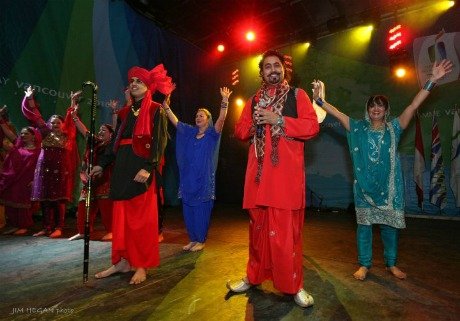
By Gagandeep Ghuman
Published: Feb. 4, 2012.
A long-time Squamish resident and a rising star in the world of Punjabi music says Bhangra has the power to bring disparate communities together.
Bhangra, a lively traditional folk dance of Punjab, has its roots in the communal festivities that follow harvesting season in spring in Punjab, India’s northern, Sikh-majority province.
Sikhs have been migrating to Canada for well over a century now, and Sikh diaspora is the strongest here in B.C., where it has rich history and deep roots.
Bhangra, as a form of cultural expression, has widespread appeal among many first and second generation Sikhs. In the past few years, Bhangra artists have meshed the traditional form with pop and hip-hop, giving ti a more contemporary, mainstream flavour.
Last year, Simon Fraser University (SFU) Bhangra team surprised Canuck fans outside the Rogers Arena with a Bhangra Flash Mob.
The dance form was also a subject of a recent exhibition in Vancouver.

Squamish resident Gurmukh Singh Johal, also known in the Punjabi music world as G. Jogi Daduwalia, wants to use thie folk dance as a bridge between communities.
“If we can’t communicate through language, then there is the common language of dance and music,” he says.
Daduwalia’s wife, Gurjit Johal, has also been teaching Bhangra at the Brennan Park Recreational Centre for the past five years.
Daduwalia came to Canada in 1978, worked as a chef at a Whistler Hotel for three decades, and now lives a semi-retired life, dividing his time between Indian and Canada.
He has been singing and writing songs ever since he was a teenager growing up in Daduwal, a village close to Jalandhar, a major city in Punjab.
But that dream was canned when he came to Canada, as he struggled to find his bearings in a new country.
Now, well settled in Squamish, he says can affford to spend more time pursuing his passion.
He has recorded two albums, Je Tu Na Hundi (If you were not there…) and an eponymously named Daduwalia.
He changed his name to ‘Jogi,’ to reflect his true state of mind.
Jogi in Punjabi means a saint, but the word also has a ring of renouncement, a man who is part of the world but lives slightly detached from it.
That sense of detachment has enabled him to focus on music and writing, Daduwalia says.
Daduwalia and his wife Gurjit Johal also presented Bhangra with his team for the 2010 Winter Olympics, which included Squamish residents of all stripes.
The event left an indelible mark on Daduwalia, who says a Bhangra team for men in Squamish would be a cultural asset.
He’s hoping to that we would be able to orgainse such a team in Squamish soon.
“Bhangra could be that language we share,” he says.




Paramjit Sidhu says
Its good for health soul too. and you are dance with 5people and u will making friends. Great for dadulwalia, good that he want bthe dance in Canadian society. Great